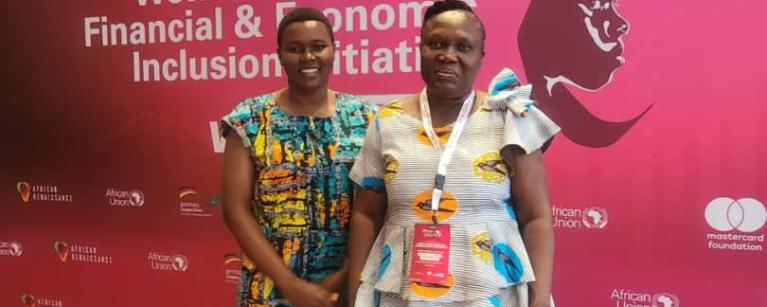The 6th Gender is My Agenda Campaign (GIMAC) Network Strategic Engagement with the African Union (AU), Regional Economic Communities (REC) and Partners was held in Accra, Ghana in July 2024 under the theme ‘’Advancing Educational Transformation for Gender Equity and Sustainability Towards Agenda 2063,’’
This was in line with the AU theme for the year: Educate an African Fit for the 21st Century: building Resilient Education Systems for Increased Access to inclusive, lifelong, quality and relevant learning in Africa.
She attended a series of meetings and sessions including the GIMAC meeting from 14-15 July 2024, the GIMAC Youth Advocacy Training on July 13, 2024; and the African Union Commission Gender Pre-Summit on 16-17 July 2024 which was a technical meeting for the Women and Youth Financial and Economic Inclusion Initiative WYFEI 2023. Below, she shares her learnings from the training.
''The 6th GIMAC meeting provided an opportunity to delve into several issues impacting educational attainment, particularly for women and girls on the continent. Insightful perspectives were raised by resource persons drawn from Governmental and Inter-governmental organisations, Parliamentary Associations, Academia and Research, CSOs, Women's Rights Organisations (WROs) and Youth-led Organisations among others.
The key messages around collaborations and partnerships to advance education were raised by several participants alongside thematic-specific issues and perspectives to inform strategies to advance the education of women and girls on the continent.
Financing Education delved into the financing strategies for education in Africa. At the same time, the session on economic empowerment emphasized education’s central role in promoting economic independence for women in Africa.
The prevailing conflict situation in parts of the continent led to discussion and recommendation on the need to strengthen the resilience of education systems to conflict by significantly increasing investment in peace education, the women, peace and security agenda and the maintenance of safe, accessible schools.
The issue of safety in schools provided a personal learning point on the concept of School Related Gender-based Violence (SRGBV) as a distinct form of GBV affecting schoolgoers to and from school as well as within schools. The Forum of African Women Educationalists (FAWE) is championing work in this area and has developed a toolkit to address SRGBV.
Further discussion also delved into the issue of Comprehensive Sexuality Education (CSE) or the many other ways this may be referred to - which was noted as being an age-appropriate curriculum-based process to provide information to protect, respect, and empower students that aims to equip children and young people with knowledge, skills, attitudes, and values that empowers them to realize their health, well-being and dignity.
The importance of CSE on school curriculums on the continent was emphasized due to the challenge of teenage pregnancy and child marriage as well as HIV, among other reasons.
It was noted that there is limited understanding of CSE on the continent and perhaps applying other terminologies will reduce the resistance to its application, enabling vital information to be provided to school-going children through the curriculum.
These were among the issues through which opportunity was provided to learn, unlearn, re-learn, and engage in robust discussion on key strategies to advance education in the continent.
The WEIFYI initiative which was launched two years ago in Accra - Ghana is an AUC Initiative. The Women and Youth Financial & Economic Inclusion 2030 Initiative (WYFEI 2030) is linked to the AU Agenda 2063 and particularly Aspiration 6, which envisions an Africa whose development is people-driven, especially relying on the potential of its women and youth.
The initiative aims to move from policy to action for millions of women and young people who comprise 75% of the Continental population. The Initiative seeks to unlock USD100 Billion for at least 10 million women and youth by 2030, leveraging and building on existing initiatives and financial instruments in the public and private sectors. The initiative is part of the activities aligned to the African Union Declaration of 2020 to 2030 as the Decade of Women’s Financial and Economic Inclusion.
The technical meeting delved into these issues and provided a platform for key stakeholders to:
• Understand the landscape and explore environmental and systems barriers
• Understand economic and financial inclusion in Africa
• Develop a proposed operational framework on WEYFEI in Africa.
“I was able to contribute to the discussion on the issue of Unpaid Care Work and how this should be factored into all gender-focused interventions for better gender outcomes; as well as the plenary discussion on interventions at personal/community with suggestion to enhance agency banking for areas not served through the physical banks, noting that this is also a policy issue and a suggested provision in 2024 for further levies in Uganda was not adopted in the Finance Bill by Parliament”
There were insights and practical experiences in doing business on the continent, the switch to formalization for many businesses, available resources on the continent and how they are being applied, several policy issues, data, digitalization and identity particularly impacting cross-border trade and the need for systematic data collection.
I was able to contribute to the discussion on the issue of Unpaid Care Work and how this should be factored into all gender-focused interventions for better gender outcomes; as well as the plenary discussion on interventions at personal/community with suggestions to enhance agency banking for areas not served through the physical banks, noting that this is also a policy issue and a suggested provision in 2024 for further levies in Uganda was not adopted in the Finance Bill by Parliament.
The meeting provided an opportunity to identify areas of complementarity with our ongoing work programme at the country level, and, how these align with the regional agenda, particularly on strategies to address inequality and gender transformation, a more productive population and improved development outcomes.
